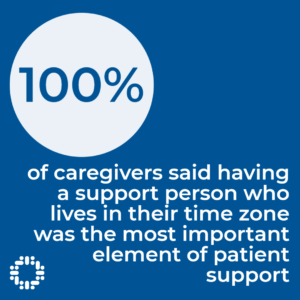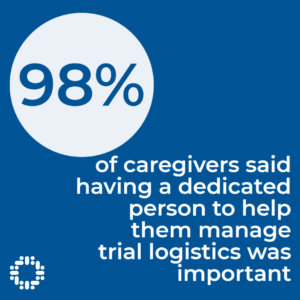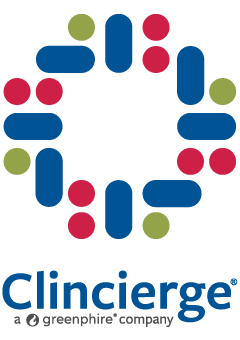In the United States, the month of November is National Family Caregivers Month (NFCM). For more than 20 years, this celebration honors the more than 40M individuals across the country who provide care for aging or ill parents, spouses, children, or other family members or friends. While the specific needs of these patients may vary, the range of emotions associated with providing care for a loved one is often the same.
For patients facing a rare disease diagnosis, emotions of fear and uncertainty often arise. Many patients will require assistance with routine daily tasks, as well as with the transportation and logistics involved in various doctor’s appointments, treatment methods, and at times, participation in a clinical trial. Patients reach out to family and friends who act as caregivers, offering critical emotional, medical, and physical support. While most pharmaceutical companies are concerned with the patient experience during treatment, few are interested in understanding the caregiver’s needs.
The Caregiver Experience
A study by Phreesia Life Sciences investigated the importance of interactions between pharmaceutical companies and those providing care for seriously ill patients.
Over 2,000 caregivers participated in the survey, and 76% of these were women, with a majority over the age of 55. The study revealed how involved caregivers are at every step of the treatment process.
- 73% are responsible for scheduling doctor’s appointments for the patient
- 75% accompany patients to their consultative visits
- 69% are responsible for picking up the patient’s prescriptions
- 64% supervise the patient’s medication protocol
It is easy to see how the patient’s illness creates additional tasks for the caregiver, many of whom are still employed and have children or aging parents who also need their attention. In addition to these added responsibilities, caregivers often take the lead when determining treatment options for the patient.
- 92% of caregivers are actively involved in conversations between the doctors and the patient
- 82% of ill patients turn to their caregivers when choosing treatment options, with many relying on them to make healthcare decisions on their behalf
Additionally, caregivers must learn about the disease and the available treatment options. They have to weigh the risks and benefits of the drugs and other possibilities while comforting the patient and keeping their best interest at heart. Many times, caregivers must endure the process of watching the patient’s health deteriorate while remaining positive and supportive.
Ways to Alleviate Stress and Emotional Burdens
As one can imagine, the emotional pressure on these caregivers can be severe. Of those surveyed in the Phreesia study, 75% reported feeling moderate to extreme stress, and 55% categorized their top need as emotional support.
While caring for rare disease patients, many caregivers become fully immersed in the many physical, mental, and emotional needs the illness causes. They often become isolated from the support they need from friends and family as they tend to the patient.
Those conducting the Phreesia study recommended specific training programs for caregivers and support services through online chat groups and connections with disease advocacy groups. It is critical these caregivers do not feel isolated in their journey.
Elevating Caregiver Voices
Clincierge recently completed a two-phase Voice of the Patient research study to determine the barriers to clinical trial participation in the rare disease space. To better understand the patient journey, the survey asked patients and their caregivers similar questions to determine what parts of clinical trial participation were the most challenging.
In the study, caregivers revealed the following emotions associated with clinical trial participation:
- Hopes and fears: they hope the treatment works, yet they fear the side effects or medicine not working
- Determination to fight the disease: we have to do this
- Anxiety and anguish: uncertainty of whether the treatment would work
- Worry: will this cause pain/suffering for the patient
Essentially, the caregivers are hopeful the new treatment will work but are worried about the patient’s adverse side effects and increased pain levels.
Travel Burdens of Trial Participation
The research also revealed the following opinions on travel related to clinical trial participation:
- 91% of caregivers said travel was stressful for themselves, and their participating loved one, or the rest of their family
- 78% of caregivers said traveling to the site was difficult
- 94% of caregivers said the travel related to participating was the primary reason for considering dropping out
- 94% of caregivers said receiving reimbursements for trial-related expenses made it easier to participate
Importance of Dedicated Support in Clinical Trials
Perhaps the most interesting statistics related to having a dedicated person to assist them throughout the trial:


Patient Concierge Services Improve Patient and Caregiver Experiences
In essence, having the concierge level of support provided by a dedicated patient care coordinator made trial participation much easier for both the patient and their caregiver. Pharmaceutical sponsors and clinical research organizations (CROs) who partner with a patient support service company allow the patient and caregiver to have an overall more positive clinical trial experience, with the ability to remain in the study through trial completion.
At Clincierge, the patient coordinator resides in the same time zone as the patient and caregiver, speaks their language, and understands the area and its cultural nuances. They are paired at trial enrollment and will work as a team through completion. The coordinator manages all travel arrangements for the patient and caregiver for the duration of the study, including securing flights and hotel accommodations, rail travel, and ground transportation. To provide personalized support services, the coordinator learns about the rare disease and how it affects the patient individually.
Furthermore, the coordinator assists with scheduling site visits and other patient and caregiver needs. The coordinator is always reachable by cell phone and learns to anticipate the patient’s preferences. For the caregiver, they become a listening ear for someone who needs to talk, cry, or yell to release the stress of the situation.
Actionable Steps to Improve Outcomes
The caregivers in these studies expressed the many emotional, financial, and logistical burdens of clinical trial participation. Still, many said they would do whatever it took to get their loved one the potentially life-saving treatment they desperately needed. Often, these caregivers revealed they put the patient’s needs above their own, resulting in emotional issues and increased stress levels.
Pharmaceutical companies and CROs are very interested in the patient experience during their rare disease clinical trial but often do not consider the caregiver’s experience. As outlined in the two studies referenced above, it is imperative to consider the caregiver’s path when creating trial protocols. Including a patient support services company, the trial sponsor provides another level of support for the patient and their caregiver. This one-on-one patient support model improves clinical trial enrollment and increases retention rates, helping rare disease patients and quickly bringing life-saving treatments to market.


